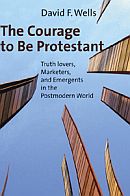 Earlier, I was talking with my brother, Stephen (who is in Baghdad right now with the Army) on instant messenger. We were talking about the Gospel and how we must be constantly fighting to center every facet of our lives upon it. Our conversations, our relationships, our marriages, our toil, our pain, our struggles, our blessings, our families, everything. Otherwise, we risk either falling into antinomianism, that is, the abuse of God’s grace with total disregard for obedience and submission to Him, or legalism, that we try and please God with our actions as the basis for our relationship with Him, which fails constantly. Both of these errors oppose the Gospel itself because both say, “I am my own Lord and Savior.”
Earlier, I was talking with my brother, Stephen (who is in Baghdad right now with the Army) on instant messenger. We were talking about the Gospel and how we must be constantly fighting to center every facet of our lives upon it. Our conversations, our relationships, our marriages, our toil, our pain, our struggles, our blessings, our families, everything. Otherwise, we risk either falling into antinomianism, that is, the abuse of God’s grace with total disregard for obedience and submission to Him, or legalism, that we try and please God with our actions as the basis for our relationship with Him, which fails constantly. Both of these errors oppose the Gospel itself because both say, “I am my own Lord and Savior.”
And Stephen said something really practical and encouraging that has helped in his pursuit of Christ while out in the Arabian deserts of Iraq, in particular a war zone, that on its face we may all inherently know but often forget as a rudimentary part of our daily approach to God. I’m simply unpacking what he said to give it some backing. It may help some of you in your respective ministries in helping people towards Christ. He said, “I’ve figured out it’s a matter of taking the time to meditate on who I am and who God is,” to which I then added, “Then we must consider what He did in Christ to bring us to Himself.”
Those three things are vital for the Christian life. When we approach God, these are things we must always consider: 1) who we are, 2) who God is, and 3) what God had to do to bring us to Himself.
All of this is sobering, humbling, and yet because of the third point, all of it brings about the most glory possible for God and the most joy possible for us who believe in Christ, because we are now finally, ultimately accepted before the only One who ever mattered. The first point involves the doctrine of sin and total inability as sinners, as MacArthur spoke about at the T4G conference this past week (MP3). We are enslaved to sin, rebellious toward God. We are desperately sick, rotting on the inside, and arrogant toward Him in our actions and words. The second point involves who God is, His nature, His essence, His character, His justice, His wrath against our sin, and His holy, correct regard for the highest value in all the universe: His name, honor, and glory. But then, the third point, we must always consider what it took for God to bring us to Himself, which reveals His infinite love and mercy toward sinners who disregard Him in all they do.
1) Who we are.
This gets right down to a good, solid, Biblical understanding of who we are as humans in Scripture. If we fail to get this, none of the other parts of the Gospel make any sense: the hell we deserve for that sin, Christ’s blood as necessary to appease God’s wrath, as just two examples, will be regarded as absolute foolishness if we believe we are not this bad. If we merely compare ourselves to others around us in regard to our righteousness, we will not appreciate the Gospel at all. One fault here in our understanding of who we are will taint our understanding of the lengths God had to go in Christ to make us acceptable in His presence. However you cannot have this proper understanding of who you are until you have rightly and Biblically compared yourself to the majesty and holiness of God (in the second point). Isaiah got it in Isaiah 6. So did Ezekiel in Ezekiel 1. And finally, so did Paul in Acts 9. And they got it only because the Lord acted upon them. Ask God to act upon you to show you your desperate condition before Him, and then patiently wait upon Him to act.
Until you see yourself in stark contrast to His nature, His character, His perfections, His frightening majesty, you cannot appreciate how awful you really are before Him. We need Scripture to see this reality, that when the Lord looks down from heaven upon the children of men (all of us) to see if there are any who are righteous, He finds not one (Psalm 14:2-3). We need the Holy Spirit, coupled with Scripture, to show us our awful estate before Him, for apart from this, we do not see ourselves as nearly as bad as we should. It is necessary to getting the Gospel right.
2) Who God is.
We must not disregard the Old Testament pictures of who God is in His justice and wrath. Many say the Old Testament presents us with a God of wrath, but the New Testament shows us a God of love and that’s who we need to focus on. This is fallacious. God is both at the same time, always has been, always will be. We must focus on all His attributes, summed up in the person of Christ. Both the Old and New Testaments show us a God of justice and love, paradoxically.
This is most clearly seen in the cross, where Christ, in His love for sinners, satisfied the justice and wrath of God in Himself. God is holy, regards His name and honor above all things in the universe, and our sinning against Him has so greatly offended Him, because each sin treads His glory, name and honor, the essence of His being, in the ground. We cannot be accepted in His presence unless something is done about our offense. We are separated from God because of our rebellion.
There is one and only one God, and yet God Himself exists in three persons, the Father, Son, and Holy Spirit. This is a mystery, but is clearly presented in the Scriptures, particularly when Jesus says Himself, “Go therefore and make disciples of all nations, baptizing them in the name of the Father and of the Son and of the Holy Spirit.” (Matthew 28:19) Three persons, One God, united in being and essence.
We must see that God is the highest essence of being in the universe, that His glory emanates forth in such beautiful and frightening array, both at the same time. There is no potential in God as if He could become greater than He already is, for He is infinitely great in every way already. He is the most courageous and powerful in all the universe, and yet He is the gentlest, mildest, and meekest of all. He is nothing like us. He is holy and burning with righteousness. Should we approach the throne of God without His righteousness on our side, we would be obliterated in destruction forever, because we are filthy, despicable sinners who have despised His name in all our ways.
3) What it took for God to bring us (sinners) to Himself.
When we approach God through Christ though, God come in the body of a human, by His righteousness on our behalf through faith, we can stand upright in the face of God’s judgment, and boldly approach the eternal throne, and claim the crown through Christ our own (Charles Wesley). Through Christ’s life-work, from His birth to His resurrection after His crucifixion, and we, being united to Him at every point through faith, do not have to fear the eternal judgment-obliteration spoken of in the last point.
But what lengths God had to go to make us acceptable before Him! He could not just let us pass before Him without regard to His honor and name that have been trodden in the dirt. Something had to be done to bring us to Himself. From eternity, this was the plan of God, to reconcile to Himself a people for His own possession, through the sacrificial death of His own Son for us, all to the glory of His grace (Ephesians 1:5-6). Christ, from eternity past, glorious in all His perfections, infinitely intertwined in the love of the Father and the Spirit, emptied Himself by becoming a human in history, taking on our very existence. In doing so, He could sympathize with us in our weakness. As a human, He lived perfectly as we never have though, loving the Father with all His heart, soul, mind, and strength, thus fulfilling the entirety of the Law. He did this to the satisfaction of the Father, who then proclaimed at the baptism of Jesus by John the Baptist, “You are my beloved Son; with you I am well pleased.” (Mark 1:11)
Whereas we have all fallen infinitely short of God’s standards of righteousness and can never succeed in making Him love us with our deeds (Isaiah 64:6), He succeeded in doing so, fulfilling the Law on behalf of those with the faith of Abraham. The only one in all the universe, infinitely worthy of glory, gave up all His rights and instead stood in the place of condemn sinners, taking in Himself the full measure of the wrath of God by His blood on the cross. The love He had with the Father and the Spirit from eternity past was cut off at the cross and He experienced hell, a hell beyond anything we humans can comprehend, because this was the God-man who was made utterly miserable. He gave up His life willingly so that He could save many (Mark 10:45). By His wounds we are healed (Isaiah 53:5).
Death did not conquer Him though, but He rose triumphant over sin, death, the devil, and hell. These historical acts, in particular His resurrection, confirm that all He said and did were true. Those who believe and trust in Him and His work for them are truly free and no longer does condemnation breathe down their neck with every breath they take. Rather, there is now no condemnation for those who are in Christ Jesus (Romans 8:1).
Keeping these three points in our approach to God gives us a proper sense of the reverential fear we should have before Him, and at the same time it gives us the freedom to approach Him without any hindrance, namely our sin. These two results coming from the Gospel creates within us a joy the far exceeds anything in the world. Our response should be, “Why did you save me? A Sinner of sinners? How can it be!?” Praise Christ for triumphantly achieving a reward for those who believe, a reward we don’t deserve: the enjoyment of God forever, the highest of joys, and then giving Him glory for accomplishing that enjoyment for us through Christ!
Further reading on Christ and all of His excellencies:
The Excellency of Christ – Jonathan Edwards


 Some persons love the doctrine of universal atonement because they say, “It is so beautiful. It is a lovely idea that Christ should have died for all men; it commends itself,” they say, “to the instincts of humanity; there is something in it full of joy and beauty.” I admit there is, but beauty may be often associated with falsehood. There is much which I might admire in the theory of universal redemption, but I will just show what the supposition necessarily involves. If Christ on His cross intended to save every man, then He intended to save those who were lost before He died. If the doctrine be true, that He died for all men, then He died for some who were in hell before He came into this world, for doubtless there were even then myriads there who had been cast away because of their sins.
Some persons love the doctrine of universal atonement because they say, “It is so beautiful. It is a lovely idea that Christ should have died for all men; it commends itself,” they say, “to the instincts of humanity; there is something in it full of joy and beauty.” I admit there is, but beauty may be often associated with falsehood. There is much which I might admire in the theory of universal redemption, but I will just show what the supposition necessarily involves. If Christ on His cross intended to save every man, then He intended to save those who were lost before He died. If the doctrine be true, that He died for all men, then He died for some who were in hell before He came into this world, for doubtless there were even then myriads there who had been cast away because of their sins. “And as he came out of the temple, one of his disciples said to him, ‘Look, Teacher, what wonderful stones and what wonderful buildings!’ And Jesus said to him, ‘Do you see these great buildings? There will not be left here one stone upon another that will not be thrown down.'” –
“And as he came out of the temple, one of his disciples said to him, ‘Look, Teacher, what wonderful stones and what wonderful buildings!’ And Jesus said to him, ‘Do you see these great buildings? There will not be left here one stone upon another that will not be thrown down.'” –  Earlier, I was talking with my brother, Stephen (who is in Baghdad right now with the Army) on instant messenger. We were talking about the Gospel and how we must be constantly fighting to center every facet of our lives upon it. Our conversations, our relationships, our marriages, our toil, our pain, our struggles, our blessings, our families, everything. Otherwise, we risk either falling into antinomianism, that is, the abuse of God’s grace with total disregard for obedience and submission to Him, or legalism, that we try and please God with our actions as the basis for our relationship with Him, which fails constantly. Both of these errors oppose the Gospel itself because both say, “I am my own Lord and Savior.”
Earlier, I was talking with my brother, Stephen (who is in Baghdad right now with the Army) on instant messenger. We were talking about the Gospel and how we must be constantly fighting to center every facet of our lives upon it. Our conversations, our relationships, our marriages, our toil, our pain, our struggles, our blessings, our families, everything. Otherwise, we risk either falling into antinomianism, that is, the abuse of God’s grace with total disregard for obedience and submission to Him, or legalism, that we try and please God with our actions as the basis for our relationship with Him, which fails constantly. Both of these errors oppose the Gospel itself because both say, “I am my own Lord and Savior.” In reading this verse tonight, I could not help but think about the Osteen’s of the American evangelical landscape and their version of the “gospel” which has been totally emptied of all Biblical content. As my dad said recently, and I agree, if you were to take out all of the Bible-words (church, Jesus, God, etc) of their message, you would basically be left with a corporate pep rally, where you have a motivational speaker who encourages unity, who at all times speaks in merely positive terms, uses entertainment for energizing the people, and gets employees fired up to go back into the workplace and do their best. No different is the message of these “preachers”. The only difference is the eternal Christ who became flesh and bore the full cup of the wrath of God on the tree is used as a means to an end, of showing people how they can have their “Best life now”. What about that is the Biblical Gospel by which we are saved, and by that alone?
In reading this verse tonight, I could not help but think about the Osteen’s of the American evangelical landscape and their version of the “gospel” which has been totally emptied of all Biblical content. As my dad said recently, and I agree, if you were to take out all of the Bible-words (church, Jesus, God, etc) of their message, you would basically be left with a corporate pep rally, where you have a motivational speaker who encourages unity, who at all times speaks in merely positive terms, uses entertainment for energizing the people, and gets employees fired up to go back into the workplace and do their best. No different is the message of these “preachers”. The only difference is the eternal Christ who became flesh and bore the full cup of the wrath of God on the tree is used as a means to an end, of showing people how they can have their “Best life now”. What about that is the Biblical Gospel by which we are saved, and by that alone?
If We Go on Sinning Deliberately
By David Westerfield
On April 24, 2008
In Theology
Excerpt taken from http://cicministry.org/commentary/issue65b.htm
For if we go on sinning willfully after receiving the knowledge of the truth, there no longer remains a sacrifice for sins, but a certain terrifying expectation of judgment, and the fury of a fire which will consume the adversaries. Anyone who has set aside the Law of Moses dies without mercy on the testimony of two or three witnesses. How much severer punishment do you think he will deserve who has trampled under foot the Son of God, and has regarded as unclean the blood of the covenant by which he was sanctified, and has insulted the Spirit of grace? (Hebrews 10:26-29)
While there are several issues evident within this complex passage, I wish to focus on the term “sinning willfully” in verse 26. Many have struggled with what exactly the author of Hebrews is trying to convey with this term. The confusion proceeds from the fact that every “sin” is indeed done “willfully” in the sense that all who “sin” do the act of their own volition, thus “willfully” in one sense of the word. Furthermore, the Apostle John makes it quite clear: “If we say that we have no sin, we are deceiving ourselves and the truth is not in us” (1 John 1:8). Thus, if we are to maintain that the Scriptures are consistent in its unified message, “sinning willfully” must have some other meaning than that noted above. The question then is: “What does the author of Hebrews have in mind when he writes the term: “sinning willfully”?
Light is cast on this difficult passage when we realize that the author of Hebrews is most probably alluding to a distinct yet similar warning found in the Old Testament. In Numbers 15 we find that those “under the law of Moses” were given instruction and warning regarding “sinning unintentionally” and “sinning willfully.” Note the following:
Also if one person sins unintentionally, then he shall offer a one year old female goat for a sin offering. The priest shall make atonement before the Lord for the person who goes astray when he sins unintentionally, making atonement for him that he may be forgiven. You shall have one law for him who does anything unintentionally, for him who is native among the sons of Israel and for the alien who sojourns among them. But the person who does anything defiantly, whether he is native or an alien, that one is blaspheming the Lord; and that person shall be cut off from among his people. Because he has despised the word of the Lord and has broken His commandment, that person shall be completely cut off; his guilt will be on him (Numbers 15:27-31).
Therefore, since the author of Hebrews clearly notes that he is making an analogy to the punishment of those who “set aside the law” (vs. 28-29), we get a somewhat clearer picture of what he means by “sinning willfully.” Since there was a distinction in the Old Testament regarding those who had received the revelation of the Lord through Moses of “sinning unintentionally” and “sinning defiantly,” the author of Hebrews makes the following point analogous to the Old Testament instructions and warning: If those who defiantly spurned the Law after receiving the knowledge of its truth were put to death, how much greater will be the punishment of those who defiantly spurn the Gospel of Jesus Christ after receiving the knowledge of its truth.
After carefully examining the passage and the roots that the author of Hebrews is relating it to, it becomes evident the definition of “sinning willfully” carries with it the meaning of one who defiantly blasphemes the Gospel after accepting the concept that it is indeed true. When this is done, only a fearful expectation of the eternal judgment of God remains for that individual.